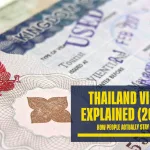Confused about Thailand Foreign-Income Tax for Expats?
This guide breaks down everything you need to know about the new Thai tax rules from 2023 to 2026 — including Orders 161 and 162, what counts as taxable foreign income, and how the proposed 2026 exemption could change the game. Learn how different expat profiles — from digital nomads to retirees — can plan smarter, use the LTR visa for protection, and legally minimize taxes while living in Thailand.
Table of Contents
Introduction
Thailand’s tax rules for expats have been on a rollercoaster ride. What was once a fairly straightforward system — where you could live here and remit overseas income without much concern — shifted dramatically with new interpretations in 2023.
By 2024, foreign residents were suddenly facing tax obligations on funds brought into Thailand, triggering confusion, concern, and in some cases, panic. But now, as of 2025, the government appears to be rethinking its stance, with a new, more relaxed draft law under discussion for 2026.
This guide breaks down:
- What changed with Orders 161 and 162,
- The proposed 2026 exemption window,
- How the Long-Term Resident (LTR) visa fits in, and
- Practical strategies for expats planning their finances.

Are You a Thai Tax Resident?
Thailand defines a tax resident as any individual who stays in the country for 180 days or more in a calendar year.
- Tax residents: Liable to Thai personal income tax (PIT) on Thai-sourced income and on foreign-sourced income remitted to Thailand.
- Non-residents: Taxed only on Thai-sourced income.
There are eight categories of “assessable income” under the Revenue Code, including salaries, pensions, rental income, dividends, and interest.
What Changed in 2024: Orders 161 & 162
Order 161/2566 — Closing the Loophole
Issued in September 2023, this order reinterpreted Section 41 of the Thai Revenue Code.
- Before 2024: Expats could remit income earned in a previous year without Thai PIT — often treated as savings.
- From 1 January 2024: Any foreign-sourced income remitted by a tax resident became taxable if it fell under assessable income categories.
This effectively ended the long-standing “defer remittance” loophole.
Order 162/2566 — Safeguarding Pre-2024 Income
To calm fears of retroactivity, the Revenue Department issued this clarification in November 2023:
- Foreign income accrued before 1 January 2024 remains exempt when remitted later.
- However, the burden of proof lies on the taxpayer to demonstrate when the income was earned.
2025 Reality Check: Why a Change Is Coming
The result of Order 161 was predictable: expats stopped remitting funds. Capital inflows slowed, and the government faced a reported shortfall in tax revenue.
By mid-2025, proposals reached the cabinet to loosen the rules again — the goal being to encourage people to bring money into Thailand instead of keeping it offshore.
The 2026 Draft Decree: A Softer Approach
As of mid-2025, a draft decree proposes that foreign-sourced income would be exempt from Thai tax if:
- It’s remitted within the same tax year it’s earned, or
- Within 12–24 months of accrual.
If approved, this would essentially bring back — and even improve upon — the pre-2024 system.
⚠️ Important: This is still a draft, not yet law. The exact window (12 months vs. 24 months) and effective date remain unconfirmed. Always check the Royal Gazette for final details.

The LTR Visa: A Parallel Tax Shield
The Long-Term Resident (LTR) visa offers one of the strongest tools for high-net-worth individuals and retirees:
- 10-year residency status
- Exemption on all foreign-sourced income
- Certain categories (e.g., Highly Skilled Professionals) enjoy a flat 17% PIT rate on Thai-sourced income
2025 Updates:
The BOI has now made the visa more accessible. The USD 80,000 annual income requirement was removed in early 2025, opening the door for retirees with investment or rental income to qualify.
For many, the LTR visa now provides the cleanest path: residency, flexibility, and a full tax exemption on foreign-sourced income.
Planning Playbook
Time Your Remittances
If the 2026 draft passes, remitting within the permitted window could mean zero Thai tax.
If you can, consider delaying large transfers until the new rules are enacted.
Keep Documentation
Taxpayers must prove when income was earned. Keep detailed records such as:
- Bank statements
- Dividend vouchers
- Property sale contracts
Use the LTR Visa
If eligible, apply early. It simplifies both immigration and tax compliance.

Real-Life Case Studies: How Different Expats Are Affected
While the new tax rules may sound abstract, their impact depends heavily on lifestyle, visa status, and spending patterns. Here’s how different expat personas are navigating the transition.
1. The Young Digital Nomad
A 27-year-old web designer based in Chiang Mai works for clients in the US and Europe, paid in USD through Wise.
Under the 2024 interpretation, if she transfers her overseas income into Thailand during the same year it’s earned, it’s taxable. However, many nomads spend directly using their foreign cards and rarely remit large sums.
Reality check: The practical tax impact is low — unless she decides to settle long-term or buy property in Thailand.
2. The Crypto Investor Cashing Out
After a successful crypto run abroad, he moves to Phuket and starts liquidating his holdings to fund a luxury lifestyle.
If he sells and remits post-2024 gains, these could be taxed as foreign-sourced capital gains. But by timing withdrawals carefully — or qualifying for an LTR visa — he can shield those funds from Thai tax.
Lesson: Big remittances tied to investment gains require documentation and timing precision.
3. The Singapore Commuter with Family in Phuket
He works full-time in Singapore but spends most of the year with his family in Phuket. Crossing the 180-day threshold makes him a Thai tax resident — even though his income is earned abroad.
If he wires money to support his family, those transfers could be considered taxable remittances under Order 161.
Best move: Keep savings offshore or rely on funds earned before 2024 until new rules clarify the exemption window.
4. The Seasonal Visitor
This semi-retired couple spends 3–4 months each year in Thailand. Since they stay under 180 days, they are not Thai tax residents and are only taxed on Thai-sourced income.
Foreign pensions or investment earnings remain outside Thai tax jurisdiction.
Key takeaway: Staying under the 180-day limit is a clean and simple tax strategy.
5. The Muay Thai Student
A young athlete comes for 9–12 months to train, occasionally freelancing online. Technically, staying over 180 days makes him a tax resident.
If he remits income during that period, it could be taxed. However, using foreign debit cards for modest expenses is unlikely to draw attention.
Reality: Compliance risk rises only with large or traceable transfers.
6. The Retiree
A retiree living off pensions and overseas rental income enjoyed full remittance freedom before 2024.
Now, those pensions are taxable if brought into Thailand — unless he secures an LTR visa, which exempts all foreign-sourced income.
Alternatively, he could wait for the 2026 exemption window that may allow remitting within 12–24 months tax-free.
Tip: Retirees should plan remittances carefully or explore LTR visa options early.
Comparison Table: 2023 → 2024 → Proposed 2026
| Period | Remittance Rule | Pre-2024 Income | LTR Visa Treatment |
| Pre-2023 | Remit prior-year income → exempt | Exempt | Not yet available |
| 2024 (DI 161+162) | Remitted income taxable if accrued post-2024 | Protected if accrued pre-2024 | Foreign-sourced income exempt |
| 2026 (Draft) | Remit within 12–24 months → exempt | Exempt | Foreign-sourced income exempt |
FAQs
Do I have to pay Thai tax if I bring my old savings?
Not if you can prove the funds accrued before 1 January 2024 (per Order 162).
What’s the proposed 2026 exemption?
Remittances within the same year or within 12–24 months could be tax-free — pending final approval.
Does the LTR visa exempt pensions and dividends?
Yes — all foreign-sourced income is exempt under the LTR visa.
What if I just use my foreign debit card in Thailand?
Small ATM withdrawals and card transactions are rarely tracked. Large remittances, however, should always be planned and documented.

Conclusion
Thailand’s tax landscape has shifted dramatically in just a few years. For expats, the message is clear:
- 2024 tightened the screws with Order 161.
- 2026 may loosen them again, offering a window for tax-free remittances.
- The LTR visa remains the most effective long-term solution.
For now, the safest strategy is to:
- Document everything.
- Time your remittances.
- Explore the LTR visa early.
- Stay informed as the 2026 draft evolves.
With careful planning, Thailand can remain a highly attractive place to live, retire, and invest — without unwanted tax surprises.















